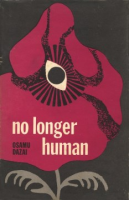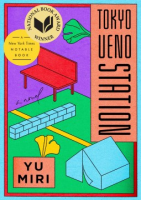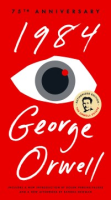Teen Book Reviews: February 2024 Page 2

No Longer Human by Osamu Dazai
Review by AN
I would describe this book as deep, painful, real and very human-like—a good portrayal of human thinking, feelings and emotions. I admit that it made me more insightful and consider my own life! It tells a story as a set of journals, Yozo's personal notebooks, who shows how disgusted he is with our species being so fake and dishonest. As he is unable to show his "true nature," which is considerably fearful, lonely, and disconnected, he decides to feign himself for society. Somehow, No Longer Human taught me how scary that is to have people so close to you be so full of obscure enigma, yourself included. It is dark and raw, thus there are some trigger warnings with concepts of death, suicidal idealization, and depression. Yozo's development is a downward spiral of unhappy relations with women, excessive drinking, drug abuse, attempts at suicide and finally a label that affirms that Yozo is no longer human. I would suggest this intriguing and powerful work to anyone who struggles to understand depression, alcoholism, and suicide. It would also appeal to people interested in personal examples of depression and abnormal psychology. It can be a great example of how some people can choose to face these things in ways that others don't perceive."

Tokyo Ueno Station My Mira Yu
Review by AN
This book was recommended to me by a classmate, and I thought this novel was odd, melancholy, slow and sparse, yet interesting. The author's style of writing in this book was neat without complications, but beautiful and near poetry in some verses. The novel begins quite a heavy read for me. The book includes history, a picture of contemporary Japan, Japanese funeral rituals, and an unusual narrator. The opaqueness of Japanese culture as it faces the problems of class, family and empire; the inexorable losses that accumulate in a long life; the magnitude of an individual's life in the face of endless time.
Kazu Mori is a manual laborer, born on the same day as the emperor and his son on the same day as the prince, their fates and lives are very different. It's a life of scarcity, hand to mouth, full of tragedies and agony. The claim of a dead narrator made me consider. He talks as if he were alive and recalling events from his life—telling about his life as well as taking the reader through the things he sees at Tokyo Ueno Station. Yu's novel demonstrates those among whom he used to mix, the busy crowds of shoppers and residents, and the homeless, gathered together in the park in their make-shift shelters. Besides following the narrator's view, which I enjoyed this kind of point of view more than I expected, I didn't pay much attention to the history events which I don't want to read as history lessons. Therefore I'd rate this 3.5 out of 5.

1984 by George Orwell
Review by Anonymous
During the past century, the steady decline of the world’s health has become not only more extreme, but more acknowledged, being irrefutable regardless of belief system or lifestyle. A highlighting piece of writing that encapsulated this doomsday-certainty is George Orwell’s 1984. In this story, the forethought afforded to the well-paced, rhythmic dynamic of events shines through intriguing words as a calling card of an author with integral skepticism and astounding awareness. Composed with sociological genius one only finds in an author’s late works, this novel is an introspective philosophy that reaches our layered and uncertain minds as we read. In its enigmatic existentialism and worryingly real predictions, we find parts of our internal dialogue reformed in twisted, thought-provoking patterns, following protagonist Winston Smith through a path of warped and harsh realities that dominate this world with control of unimaginably normalized cruelty. As Winston stumbles through the precise regulations of culture and humanity, he and another woman stuck in the system find a bond in their mutual defiance against ‘Big Brother’, an all-encompassing symbol of the brutal government’s power. Their lackluster relationship revolves around efficient loopholes, a tether to the idea that they are free so long as they know that they want to be. Orwell expresses it best when he writes, “being in a minority, even in a minority of one, did not make you mad. There was truth and there was untruth, and if you clung to the truth even against the whole world, you were not mad.” Walking alongside the two lovers, as they navigate what they’ve been taught and unwittingly move towards what they will have no choice but to believe, entirely absorbs anyone partaking in the story. As our inherent understanding that good will prevail slowly crumbles around us as a society, what once seemed to be controlled spirals into an agenda entirely out of our hands, resulting in the confrontation of not only mankind’s future, but our own ignorant prayers.

